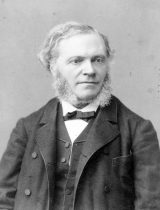Archives

Due to his understanding of fugue, Bach, and his relationship with the organ, César Franck’s inspiration from these sources can be seen throughout his compositions. The pieces that are considered to embody his full genius include a String Quartet (1889), Piano Quintet (1879), Violin Sonata (1886), and Symphony (1886-8). These pieces use the concept of thematic transformation and are also cyclic in structure. With themes frequently centering on a single note, his development gives the effect of yearning and incompleteness and he utilizes chromaticism, frequent free modulations, and a tendency to blur the lines between modes.
César Franck, born in Belgium in 1822, was a French composer whose musical career was spearheaded by the ambitions of his father, who arranged for his first concert tour when he was only eleven. In 1836, Franck’s father moved the family to Paris with the goal of him being accepted to study at a conservatory. The following year, Franck began attending the Conservatoire de Paris studying both composition and the piano as well as gaining recognition as a writer of fugues. In 1842, Franck’s father removed him from the Conservatoire with the aim of Franck becoming a virtuoso at the piano. It was at this time that Franck composed his first piano trios. Frustrated with the lack of success, Franck earned his living by teaching and giving recitals. In 1848, Franck married and was appointed as the organist at Notre Dame de Lorette. He remained there until moving to St Jean-Françoise-du-Marais in 1853 and finally the St Clotilde in 1858. Franck, despite his long tenure as organist, is considered to have been more of a “Bach player” and improviser rather than virtuoso. His Mass for three voices and Six pieces pour grand orgue achieved him success and gained the attention of piano virtuoso and composer Liszt.
In 1872, Franck was appointed as the professor of organ at the Conservatoire and produced a steady stream of compositions throughout the remainder of his life. Students included d’Indy, Vierne, Lekeu, and, for a short time, both Debussy and Bizet. Franck died in 1890 after being tragically trampled by a horse-bus.
|
Friday, July 6, 2018: 7:00 pm Recital
|
|
Monday, July 23, 2018: 8:00 pm Concert
|



